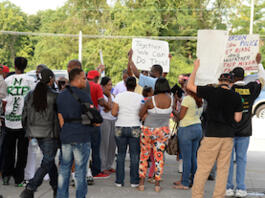46% Think Justice System Fair to Blacks, 39% Disagree
A plurality of voters still believes the U.S. justice system is fair to black and Hispanic Americans following the grand jury decision in the Michael Brown shooting case in Ferguson, Missouri. But there also continues to be a wide difference of opinion between whites and other voters.
A new Rasmussen Reports national telephone survey taken the night the verdict was announced and the night after finds that 46% of Likely U.S. Voters feel the justice system is fair to these Americans. But 39% disagree and say the system is not fair to blacks and Hispanics, the highest finding on this question in regular surveying since June 2010. Fifteen percent (15%) are undecided. (To see survey question wording, click here.)
The number who believe the justice system is fair to blacks and Hispanics has ranged from 45% to 50% in surveys for the past four-and-half years. Those who think it is unfair to these Americans has steadily increased from 30% to 39% in that same period.
Just 32% think the justice system is fair to poor Americans, down from 40% in 2010 but consistent with surveying for the last couple years. Fifty percent (50%) now disagree, up one point from March but also in line with recent surveys. Eighteen percent (18%) are not sure.
Forty-four percent (44%) of voters think the justice system is fair to most Americans. That’s up two points from March’s all-time low of 42% but consistent with surveys since 2010. However, just as many (44%) say the system is not fair to most Americans, a new high and a finding that also has been steadily on the rise. Fifteen percent (15%) are not sure.
In June 2010, 55% said the U.S. system of justice was fair to most Americans, while only 29% disagreed.
(Want a free daily e-mail update? If it's in the news, it's in our polls). Rasmussen Reports updates are also available on Twitter or Facebook.
The national telephone survey of 1,000 Likely Voters was conducted by Rasmussen Reports on November 24-25, 2014. The margin of sampling error for the survey is +/- 3 percentage points with a 95% level of confidence. Fieldwork for all Rasmussen Reports surveys is conducted by Pulse Opinion Research, LLC. See methodology.
Few Americans expected the white police officer charged with killing black teenager Michael Brown to be charged with murder, but they strongly anticipated the violent protests that followed that grand jury decision.
Only 12% of working Americans consider themselves poor. The overwhelming majority (85%) view themselves as middle class.
Eighty-four percent (84%) of blacks and 56% of other minority voters now consider the justice system unfair to black and Hispanic Americans, while 54% of whites view the system as fair to these minorities. That marks little change in the attitudes of whites and blacks since March, but other minorities have a much more negative assessment of the system's fairness now.
Interestingly, though, whites by a 45% to 37% margin agree with 82% of blacks and 56% of other minority voters than the justice system is not fair to poor Americans.
Fifty-one percent (51%) of white voters believe the U.S. justice system is fair to all Americans. Seventy-five percent (75%) of blacks and 64% of other minority voters disagree.
Men are more likely to believe in the fairness of the justice system than women are. Generally speaking, the younger the voter, the more likely he or she is to think the justice system is unfair.
Wealthier voters have more confidence in the fairness of the justice system than those who earn less.
Twenty-eight percent (28%) of all voters now think the U.S. Supreme Court is doing a good or excellent job, while 23% rate its performance as poor. These findings are generally in line with those measured over the past several years.
In ideological terms, 31% think the Supreme Court is too liberal, down two points from September and the lowest finding since June 2012. Just as many (31%) now think the Supreme Court is too conservative, the highest finding in more than five years of regular tracking. Twenty-five percent (25%) say the Court is about right politically. Thirteen percent (13%) are not sure.
There is little partisan difference in opinion when it comes to how the high court is doing its job. But 55% of Republican voters believe the Court is too liberal, while most Democrats (53%) see it as too conservative. Among voters not affiliated with either political party, 32% see the Court as too conservative, 29% as too liberal and 26% as about right.
Sixty-one percent (61%) think most Supreme Court justices have their own political agenda, while just 24% think they generally remain impartial.
Fifty-eight percent (58%) of Americans trust a jury more than a judge to determine the guilt or innocence of someone accused of criminal behavior. Just 22% trust a judge more, while nearly as many (20%) are not sure.
Twenty-two percent (22%) of blacks and other minority Americans think most cops are racist, compared to just nine percent (9%) of whites.
But 57% of all Americans say the tactics used by their local police are about right. Fifty-one percent (51%) think America needs more cops.
Most voters have an unfavorable opinion of the U.S. Department of Justice and think it is more interested in politics than in serving justice.
Additional information from this survey and a full demographic breakdown are available to Platinum Members only.
Please sign up for the Rasmussen Reports daily e-mail update (it's free) or follow us on Twitter or Facebook. Let us keep you up to date with the latest public opinion news.
The national telephone survey of 1,000 Likely Voters was conducted by Rasmussen Reports on November 24-25, 2014. The margin of sampling error for the survey is +/- 3 percentage points with a 95% level of confidence. Fieldwork for all Rasmussen Reports surveys is conducted by Pulse Opinion Research, LLC. See methodology.
Rasmussen Reports is a media company specializing in the collection, publication and distribution of public opinion information.
We conduct public opinion polls on a variety of topics to inform our audience on events in the news and other topics of interest. To ensure editorial control and independence, we pay for the polls ourselves and generate revenue through the sale of subscriptions, sponsorships, and advertising. Nightly polling on politics, business and lifestyle topics provides the content to update the Rasmussen Reports web site many times each day. If it's in the news, it's in our polls. Additionally, the data drives a daily update newsletter and various media outlets across the country.
Some information, including the Rasmussen Reports daily Presidential Tracking Poll and commentaries are available for free to the general public. Subscriptions are available for $4.95 a month or 34.95 a year that provide subscribers with exclusive access to more than 20 stories per week on upcoming elections, consumer confidence, and issues that affect us all. For those who are really into the numbers, Platinum Members can review demographic crosstabs and a full history of our data.
To learn more about our methodology, click here.





